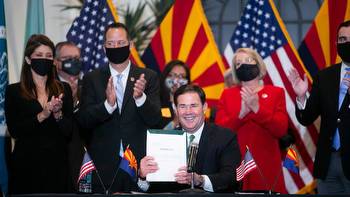Why a Las Vegas casino holds the key to Western water

Hallway exchanges and happy hour chats at an annual conference at a Las Vegas hotel this week will determine the direction of the American West's most high-stakes water fight. | John Locher/AP
LAS VEGAS, Nevada — The country’s highest-stakes water fight in a century is playing out this week at a Las Vegas casino.
The seven Western states that share the Colorado River are facing a looming spring deadline to agree on how to share its dwindling flows. The negotiations will shape the future of the West — and they’ll depend, more than anything, on the personalities around the table.
There isn’t a single, or even two or three, fronts to the American West’s water wars. Fault lines cut between states, regions and rural and urban users. And the people leading the negotiations aren’t governors, state lawmakers or even elected officials for the most part: They’re local appointees, bureaucrats and engineers.
It’s a mix of old and new players, some with decades of experience and others cutting their teeth during the most consequential water negotiations in modern times.
The Colorado River Water Users Association conference kicking off Wednesday at the Paris Las Vegas Hotel and Casino draws everyone with a stake in the West’s most important waterway, from the general managers responsible for delivering water to some of the country’s largest cities to the bolo tie-wearing cowboys responsible for opening the headgates at their local irrigation districts.
This year’s gathering will be an opportunity for the power players to bolster their negotiating positions from the podium, then turn to quiet conversations with their counterparts in side rooms over cocktails.
Both are essential if states — and the federal government — are going to solve the Rubik’s cube of the waterway’s problems, which stem both from overuse and from climate change’s shrinking of long-term supplies.
Here’s POLITICO’s list of who to watch as the negotiations open.
J.B. Hamby
The 27-year-old Stanford history major represents a farming community in southeast California that holds some of the river’s most powerful rights. This year he catapulted into the middle of the fight when he rose to chair of the Colorado River Board of California, which makes him the state’s lead negotiator. His first big move was to fire back against a six-state proposal that would have singled California out for the largest cuts; his second was to help strike a short-term deal with Arizona that aims to head off the crisis for at least a few years. He’s known for his mastery of details as well as his fresh-faced, conciliatory perspective that has given other players on the river hope that a deal can be struck without too many lasting wounds. But, as an elected director of the state’s largest and most-senior Colorado River rights holder, the Imperial Irrigation District, he’s also beholden to his farming neighbors intent on maintaining their livelihoods.
Adel Hagekhalil
The relatively new general manager of California’s largest drinking water supplier, the Metropolitan District of Southern California, has been compared by at least one source to a “Hallmark card” because of his frequent use of words like “collaboration,” “holistic” and “integration.” He’s on the back foot as representative for the state’s more junior water rights holder, but he has an ace up his sleeve: the district’s ability to pull water from elsewhere, including local sources where Met has heavily invested in water recycling and storage, and Northern California.
Tom Buschatzke
Buschatzke, one of the veterans in the room, represents Arizona in Colorado River negotiations as director of Arizona’s Department of Water Resources. The growing Sunbelt cities he represents are among the most at risk in the West of running out of water — a challenge he’s acutely aware of, having previously managed the city of Phoenix’s water resources for more than two decades. He’s learned to weather shifting political winds in the purple state, where Democrats and Republicans take at-times opposite approaches to water scarcity, the former blaming overuse and the latter, regulations.
Rebecca (Becky) Mitchell
Colorado Gov. Jared Polis elevated Mitchell in August when he promoted her from the director of the Colorado Water Conservation Board to the state’s first full-time rep at the Upper Colorado River Commission, where she’s the lead negotiator for Colorado. That belies the growing importance of the Colorado River in her state, where purple politics mix with a growing urban population. Described as friendly and as a “firecracker,” her position will be key as upper basin states on one side and lower basin states on the other attempt to bridge their deep differences for a long-term deal.
Camille Calimlim Touton
Presidential administrations of all stripes have preferred the states take the lead in negotiations over the river, but Touton, the Bureau of Reclamation commissioner, hasn’t been afraid to wield federal power. She issued an ultimatum last summer, when reservoir levels were careening towards crisis points, and eventually put legal teeth behind her threat to intervene unilaterally. But she’s got a fine line to walk for the Biden administration, which is keenly aware of the political implications of federal dictates in swing states like Arizona. She has one big thing going for her, though: a $4 billion pot of money from Congress that was essential to clinching a short-term deal this spring to head off the near-term crisis.
Bonus
There are the main players; then there are those shaking up the game. Tribes, whose ancestral claims to roughly 25 percent of the river’s water have long been ignored, are gaining ground. They are successfully enforcing their rights and striking agreements with the federal government, where they have a strong ally in Interior Secretary Deb Haaland — the first Native American to serve as a cabinet secretary. Other key people to watch: Daryl Vigil, the longtime water administrator of the Jicarilla Apache Nation in New Mexico, and Governor Stephen Roe Lewis of the Gila River Indian Community in Arizona.




















